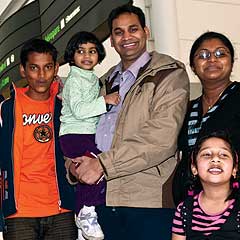ORAT was created in January 2009 and only 15 months later it is a testimony to the recommitment of Catholics to refugee sponsorship. The number of sponsors in the past year nearly doubled, with 20 parishes and two religious orders coming forward to provide support and resources for refugees, said Martin Mark, director of ORAT. Almost half of the cases involved Iraqi refugees.
“Last year we had the most new sponsorships submitted than at any time in the past decade,” Mark said. “A few years ago, it was difficult to get a return call from a parish and now parishes are responsive or even proactive.”
ORAT servicesThe Office for Refugees helps enable communities, parishes, religious orders and other groups to become involved in the Private Sponsorship Refugee Program (PSP Program) through: Information Sessions — Held regularly to educate groups interested in becoming involved in the sponsorship program, as well as provide information to the general public about the legal means to come to Canada Parish Information Nights — Held in individual parishes to provide parish councils, committees or interested parishioners information on the PSP Program, the Iraq crisis and general refugee issues. Training — Provided to people interested in become well versed on issues of settlement and integration on an ongoing basis. A refugee sponsorship e-training course is also available. Referrals — In some cases, help individuals with professional referrals in regards to refugee and immigrations issues or advocacy methods. For additional information, call (416) 645-0827 (100), e-mail refugeeoffice@archtoronto.org. |
“At that time, it was much more simple,” Mark said. “You just filed a one-page request and then the refugees came in a few weeks or months.”
Today it might take anywhere from four-to-six months just to collect proper documentation and to simply submit a sponsorship request to Immigration Canada. Then, depending on which foreign embassy they are dealing with, it can take from one to five years to process the request.
But the situation has greatly improved since the days when Mark worked with the Catholic Cross Cultural Services about seven years ago. CCS had taken over the role of sponsorship facilitator for the archdiocese
“There was no real interest, not too many cases were submitted and it was very slow and difficult,” Mark said.
“We started to build with a lot of different volunteers from parishes and really we got a very enthusiastic volunteer team who literally, day and night and sometimes weekends, helped us go through on different files. We prepared more and more submissions and committed more and more churches.”
Previous to the creation of ORAT, another 25 parishes and five religious orders collaborated with the archdiocese in sponsoring refugees.
One volunteer, Rabea Allos, together with Mark and a core team of six people, started meeting with staff from the ministry of immigration to improve the refugee process so that Iraqi Christians could come to Toronto. He says the government’s positive response has helped save the lives of many Iraqis but there is still much work to be done. Even if the government increases the number of refugees allowed into the country, it won’t help unless citizens respond. Part of Mark’s mission is to mobilize faith communities.
“As far as challenges, ORAT has doubled their sponsorship applications over the past year and most of the applications this year are going for Iraqis, but still ORAT is understaffed,” Allos says.
Mark says ORAT could increase the number of refugees it helps if it had more resources and volunteers. Currently, the office receives a budget from Catholic Charities that covers the salary of three full-time employees. Anything else, like a conference in Toronto organized in January, requires private donations.
To sponsor a refugee, a sponsoring parish or group must raise about $10,000 or the equivalent amount in services and in-kind help.
“If the Catholic sponsors, nationally, do not increase their activity, then regardless of the extra quota Canadian private sponsors got from the immigration minister for this year, we will not be able to fill it and those spots will be lost,” he said.
Of 90 sponsorship agreement holders in Canada, Mark says, 25 are Catholic organizations or dioceses. Mark believes if others stepped up they’d have a fulfilling experience.
“This is something for me which is like a little miracle,” Mark says, explaining the rewards of being able to bring about serious change to the lives of suffering people.
As the director of ORAT, he is witness to every step of the process, from the time people approach the office for training or to assess a refugee’s case to the end point when refugees have been settled in Canada for 12 months.
So far, he said, the past 12-month cycle is the best one he’s seen.
“The private refugee sponsorship program is a tool which offers a final solution and gives the big picture because, beyond just selecting and bringing the people here, our goal, and usually we achieve it around 90 per cent, is for them to gain financial independence,” Mark said. “Welfare and assistance are not even in our vocabulary.”


 TORONTO - Helping refugees is a prime example of what it means to “go in peace to love and serve the Lord,” says Toronto Archbishop Thomas Collins, and through the archdiocese’s Office for Refugees (ORAT) Catholics have been able to follow Christ’s example in caring for others.
TORONTO - Helping refugees is a prime example of what it means to “go in peace to love and serve the Lord,” says Toronto Archbishop Thomas Collins, and through the archdiocese’s Office for Refugees (ORAT) Catholics have been able to follow Christ’s example in caring for others.